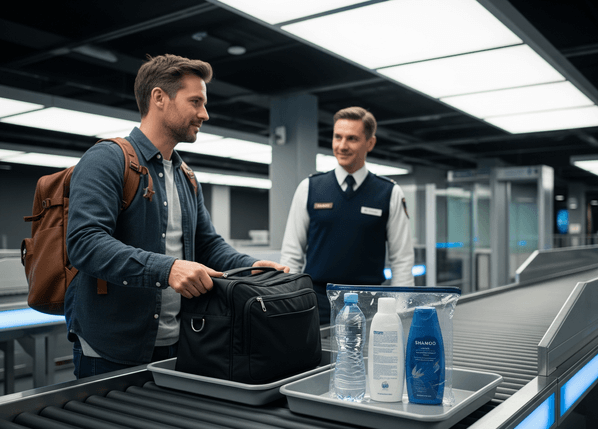New liquid rule at European airports 2025: what changes for Brazilians

One of the biggest frustrations of travelers is about to end! The European Union officially approved the end of the 100ml limitation for liquids in hand luggage, but this change comes with some important peculiarities that every Brazilian traveler needs to know.
If you're planning a trip to study or work in Europe, this information could revolutionize your airport experience. We will explain everything you need to know about this historic transformation.
What really changed in European rules
The European Civil Aviation Conference (ECAC) confirmed that passengers can carry up to 2 liters of liquids per container in hand luggage, as long as they board at airports equipped with the new CT scanners.
This revolutionary technology allows you to detect threats with much more precision, eliminating the need to:
- Removing liquids from hand luggage
- Separate electronics like laptops and tablets
- Respect the 100ml limit for liquids, gels and aerosols
- Use clear plastic bags
Important: Not all airports have this technology yet, which can create some confusing situations while traveling.
Which airports have already adopted the new rule
Currently, more than 700 CT scanners are operating at European airports. Countries that have already started implementation include:
- Germany - Several major airports
- Italy - Milan Linate and Malpensa have already officially confirmed
- Lithuania - Modernized airports
- Malta - Updated infrastructure
- The Netherlands - Main international hubs
- Sweden - Strategic airports
- Ireland - Some security points in Dublin and Shannon
For those who are planning study and work in Germany, this change represents a significant ease, especially considering that many students have to transport specific products from Brazil.
What does this mean in practice for exchange students
If you're preparing for a program like study and work in Spain or planning your exchange in Malta, these changes may directly impact your travel experience.
Benefits for students:
- Complete hygiene products: You can take shampoo, conditioner and creams in normal sizes
- Liquid medicines: Easier to carry essential medicines
- Brazilian products: Opportunity to bring specific items from Brazil for the initial period
- Less stress when boarding: More agile and less bureaucratic process
Necessary care:
- Always check: Not all airports have the new technology
- Connecting flights: The destination airport can still follow the old rules
- Round-trip trips: Rules may be different on the way back
As highlighted by our guide on luggage when traveling internationally, it is essential to always be up to date on the specific regulations of each destination.
How to avoid problems while traveling
Safety strategy:
- Search beforehand: Check if the airports on your route have CT scanners
- Keep plan B: Take essential products within the traditional 100ml limit
- Confirm information: Check the airport's official website before traveling
- Document yourself: Save official information about the rules to your cell phone
For exchange students, these precautions are even more important. Following our Travel tips on how to pack your bags, you can prepare for any scenario.
Popular European countries among exchange students:
- Ireland: Some airports have already implemented it, but official confirmation is still pending
- Spain: Gradual implementation at major airports
- Germany: Leadership in the adoption of new technology
- Malta: Modernization in progress
If you're considering a High School abroad in any of these countries, it's worth following the updates specific to each destination.
The historical context of the change
Why did the 100ml rule exist?
Since 2006, the limitation has been implemented after a terrorist threat involving liquid explosives disguised as refrigerants on transatlantic flights. For nearly two decades, travelers have become accustomed to:
- Maximum containers of 100ml
- Transparent plastic bag (mandatory)
- Total limit of 1 liter per passenger
- Mandatory separation during inspection
Technological evolution:
The new CT scanners represent a qualitative leap in threat detection, allowing detailed 3D analysis of luggage without compromising security.
Specific impact for Brazilian students
Who is it for Preparing for the first exchange, this change may mean:
Practical facilities:
- Brazilian beauty products: Take your favorite cosmetics in regular sizes
- Specific medications: Greater flexibility for continuous treatments
- Comfort items: Products that can help with initial adaptation
Financial economics:
- Less need to buy expensive products at the destination
- Use of products already purchased in Brazil
- Possibility to bring liquid gifts to international colleagues
Situations that still require attention
International connections:
- Airports outside the EU: They can keep old rules.
- Specific airlines: Some may have their own policies.
- Final destinations: Check final destination country rules
Specific products:
Even with the new rules, some items may still have restrictions:
- Flammable products
- Specific chemical substances
- Controlled medications
Final tips for exchange students
Smart preparation:
- Stay informed: Follow official airport updates
- Plan scenarios: Get ready for old and new rules
- Document everything: Have official confirmations always available
- Be flexible: Be prepared for last-minute adaptations
Useful resources:
- Official airport websites
- Updated airline apps
- Consulates and embassies for clarification
- Agencies specialized in exchange
Following our Tips for the first day of the exchange, you will be well prepared to take advantage not only of these airport facilities, but of your entire international experience.
Be Easy
This historic change in European baggage rules represents yet another facility for those who dream of an international experience. Na Be Easy, we follow all the updates that may impact the journey of our exchange students, offering complete guidance from planning to arrival at the destination. Our specialized team is always up to date on international regulations and changes that may benefit our students. Contact us and discover how we can make your exchange trip even smoother and more successful!


